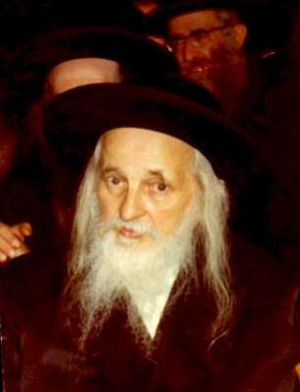Related Research Articles

Hasidism or Hasidic Judaism is a religious movement within Judaism that arose in the 18th century as a spiritual revival movement in contemporary Western Ukraine before spreading rapidly throughout Eastern Europe. Today, most of those affiliated with the movement, known as hassidim, reside in Israel and in the United States.

Chabad, also known as Lubavitch, Habad and Chabad-Lubavitch, is a dynasty in Hasidic Judaism. Belonging to the Haredi (ultra-Orthodox) branch of Orthodox Judaism, it is one of the world's best-known Hasidic movements, as well as one of the largest Jewish religious organizations. Unlike most Haredi groups, which are self-segregating, Chabad mainly operates in the wider world and caters to nonobservant Jews.

Joel Teitelbaum was the founder and first Grand Rebbe of the Satmar dynasty.

Satmar is a group in Hasidic Judaism founded in 1905 by Grand Rebbe Joel Teitelbaum (1887–1979), in the city of Szatmárnémeti, Hungary. The group is a branch of the Sighet Hasidic dynasty. Following World War II, it was re-established in New York and has since grown to become one of the largest Hasidic dynasties in the world, comprising around 26,000 households.

Modzitz, or Modzhitz, is the name of a Hasidic group within Orthodox Judaism that derives its name from Modrzyce, one of the boroughs of the town of Dęblin, Poland, located on the Vistula River.
Jewish leadership has evolved over time. Since the destruction of the Second Temple in Jerusalem in 70 CE, there has been no single body that has a leadership position over the entire Jewish diaspora. Various branches of Judaism, as well as Jewish religious or secular communities and political movements around the world elect or appoint their governing bodies, often subdivided by country or region.

Belz is a Hasidic dynasty founded in the town of Belz in Western Ukraine, near the Polish border, historically the Crown of the Kingdom of Poland. The group was founded in the early 19th century by Rabbi Shalom Rokeach, also known as the Sar Shalom, and led by his son, Rabbi Yehoshua Rokeach, and grandson, Rabbi Yissachar Dov, and great-grandson, Rabbi Aharon, before the Nazi invasion of Poland in 1939. While Aharon managed to escape Europe, together with his brother Rabbi Mordechai Rokeach, most of the Belz Hasidim were murdered in the Holocaust. Aharon re-established the Hasidic community in Israel following World War II. As of the 2020s, Belz has sizable communities in Israel, Western Europe, and the Anglosphere.

Munkatch Hasidism is a Hasidic sect within Haredi Judaism of mostly Hungarian Hasidic Jews. It was founded and led by Polish-born Grand Rebbe Shlomo Spira, who was the rabbi of the town of Strzyżów (1858–1882) and Munkacs (1882–1893). Members of the congregation are mainly referred to as Munkacs Hasidim, or Munkatcher Hasidim. It is named after the Hungarian town in which it was established, Munkatsh.
A nigun or niggun is a form of Ashkenazi religious song or tune sung by groups. It is vocal music, often with repetitive sounds such as "Bim-Bim-Bam", "Lai-Lai-Lai", "Yai-Yai-Yai" or "Ai-Ai-Ai" instead of formal lyrics. Sometimes, it is defined as a mysterious musical form of prayer or a spiritual language beyond regular words. Also, Bible verses or quotes from other classical Jewish texts are sometimes sung repetitively to form a nigun. Some nigunim are sung as prayers of lament, while others may be joyous or victorious.

Klausenburg, also known as Sanz-Klausenburg, is a Hasidic dynasty that originated in the Transylvanian city of Cluj-Napoca, today in Romania.

Ziditshov is a Hasidic dynasty originating in town Ziditshov, in Galicia. It was founded by Rebbe Tzvi Hirsh of Ziditshov. Today, the few who remain of the Ziditshov dynasty live in Brooklyn, Monticello, New York, Chicago, Baltimore, London, and Israel.

Boyan is a Hasidic dynasty named after the town of Boiany in the historic region of Bukovina, now in Ukraine. The Hasidut is headquartered in Jerusalem, with communities in Beitar Ilit, Bnei Brak, Manchester, Australia, Beit Shemesh, London, Antwerp, Manhattan, Brooklyn, Los Angeles, Monsey, Lakewood, and Atlanta. Boyan is one of the branches of the Ruzhiner dynasty, together with Bohush, Chortkov, Husiatyn, Sadigura, Kapishnitz, Vaslui and Shtefanesht.

Rymanów is a town located in the Subcarpathian Voivodeship, in the southeastern tip of Poland, with 3,585 inhabitants. It is a capital of a separate commune within Krosno County. Rymanów is situated in the heartland of the Doły (Pits) valley, and its average altitude is 420 metres (1,377.95 ft) above sea level, although there are some hills located within the confines of the town.

Menachem Mendel Torem of Rimanov also known as Mendele Rimanover was a famous Hasidic Rebbe and one of the first five distributors of the Hasidic movement in Poland and Galicia together with Rabbi Yaakov Yitzchak of Lublin, Rabbi Yisrael Hopstein, Rabbi Avraham Yehoshua Heshel of Apta, and Rabbi Kalonymus Kalman Epstein.

Moetzes Gedolei HaTorah is the supreme rabbinical policy-making council of the Agudat Yisrael and Degel HaTorah movements in Israel; and of Agudath Israel of America in the United States. Members are usually prestigious Roshei Yeshiva or Hasidic rebbes, who are also usually regarded by many Haredi Jews to be the Gedolim ("great/est") sages of Torah Judaism. Before the Holocaust, it was the supreme authority for the World Agudath Israel in Europe.

Yossi Green is a Hasidic Jewish composer of contemporary Jewish religious music. As of 2013 he had written more than 700 melodies in the genres of pop music, classical music, liturgical music, Hasidic music, and show tunes. His songs have appeared on more than 120 albums and CDs. His clients include most of the superstars of the Orthodox Jewish music world. He has released four greatest hits albums titled Shades of Green, and a solo album, The 8th Note. He regularly performs at charity benefits accompanied by popular Jewish singers under the rubric "Yossi Green & Friends".
Rimanov is the name of a Hasidic rabbinical dynasty within Orthodox Judaism. The dynasty originated in Rymanów in Poland's Subcarpathian Voivodeship.
Kaliv is a Hasidic dynasty founded by Yitzchak Isaac Taub (1744–1821) of Nagykálló, Hungary.
Sol Zim is an American cantor. He lives in Queens, New York.
References
- 1 2 3 4 Levin, Neil W. "Israel Schorr (1886 – 1935)". www.milkenarchive.org. Milken Archive of Jewish Music . Retrieved 2024-08-08.
- ↑ "Cantorially Speaking" (PDF). Congregation Agudath Shalom. Retrieved 2013-03-19.[ permanent dead link ]
- ↑ "3,000 Pay Homage to Rovner, Dean of Hebrew Composers". The Brooklyn Daily Times. March 19, 1925. p. 9.
- ↑ "Rev Israel Schorr Will Give Concert in Synagogue Here". The Pittsburgh Post. February 13, 1927. p. 4.
- ↑ "Atonement Day Services Fixed". The Courier-News. September 30, 1930. p. 6.
- ↑ "Rejoice with Itzhak Perlman and Cantor Yitzchak Meir Helfgot, Airs on THIRTEEN's Great Performances, Thursday, August 28 at 9 p.m. on PBS". New York: PR Newswire. August 6, 2014. ProQuest 1551480587.
- ↑ "Mrs. Israel Schorr". The New York Times . 1961. p. 23. ProQuest 115468208.
- ↑ "The First Twenty-Five Years - From 1947-1972". The Cantors Assembly. Archived from the original on 2011-07-18. Retrieved 2011-02-07.